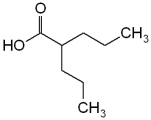PHOENIX, ARIZ. -- Valproate used as a mood stabilizer in bipolar disorder can cause polycystic ovary syndrome in about 10% of the women who take it, according to study results presented by Dr. Hadine Joffe of Harvard Medical School, Boston.
The results suggest that all women starting valproate should, at the very least, be warned about the possibility of developing polycystic ovary syndrome (PCOS). Physicians should closely monitor women on valproate, and should look for such signs of PCOS as oligomenorrhea, acne, and hirsutism, Dr. Joffe said at a meeting of the New Clinical Drug Evaluation Unit sponsored by the National Institute of Mental Health.
The study, which was ancillary to the Systematic Treatment Enhancement Program for Bipolar Disorder (STEP-BD), included 230 women evaluated for treatment-emergent PCOS. A total of 86 of those women were taking valproate; 144 women were taking other mood stabilizers, including lithium, lamotrigine, topiramate, gabapentin, carbamazepine, and oxcarbazepine.
Of the 86 women taking valproate, 9 (10.5%) developed PCOS after starting the drug, compared with 2 (1.4%) of the 144 women taking other mood stabilizers, representing a relative risk for the disorder of 7.5 in the women taking valproate. The difference between groups was statistically significant.
Two possible risk factors emerged that may increase the chance that a woman taking valproate will develop PCOS. Women in the valproate group tended both to be younger and to be using antipsychotics, especially atypical antipsychotics. Because of the small number of women with treatment-emergent PCOS in this study, however, these risk factors must be regarded as tentative.
When PCOS developed in the women taking valproate, it always did so in fewer than 12 months (median 3 months).
Based on that finding, he recommended that patients already on valproate be monitored closely if they've been taking the drug for fewer than 12 months. If they've been taking valproate for more than 12 months, on the other hand, their risk period may have passed.
If PCOS symptoms emerge in a patient taking valproate, the clinician has two options. The patient could be switched to another mood stabilizer, but given that valproate appears to be especially effective in some women with bipolar disorder, this option is often problematic. Alternatively, the patient could continue taking valproate but also be referred to an endocrinologist for PCOS treatment.
Just how valproate might cause PCOS remains unknown, although several mechanisms have been proposed. For example, valproate is known to stimulate ovarian androgen production. It also can result in weight gain and insulin resistance, both risk factors for PCOS. In the liver, the drug can increase unbound testosterone.
The study was sponsored by the National Institutes of Mental Health and Abbott Laboratories Inc., which manufactures valproic acid derivatives under the brand names Depakote, Depakene, and Depacon.
BY ROBERT FINN
San Francisco Bureau
COPYRIGHT 2004 International Medical News Group
COPYRIGHT 2004 Gale Group



